HONESTLY, WHAT IS AND IS WHAT IS NOT, QUINTESSENTIALLY BRITISH: HIGH TEA, SNOBBERY AND RESERVE
My American friends (and I’m lucky enough to have many) are always a little disconcerted to discover that High Tea is not actually something we Brits do on a regular basis, nor is Afternoon Tea, really. And even if it were, what is the difference between the two of them? Well, that’s the first honestly quintessentially British thing I can reveal. We have a penchant for confusing nomenclature (and borrowed foreign words – as demonstrated!). Why have one word for something, when you can have two, three or four? For the record, we do not habitually eat cucumber sandwiches with crusts cut off (which are neither substantial or delicious) nor do we drink our tea from bone china cups with our little pinkies pointing outwards (which is uncomfortable and ludicrous!) – two mainstays of Afternoon Tea. I think we did so, in the 18th Century when tea drinking was a social event for the upper classes and accompanied cake and sandwich eating at about 4pm in the afternoon – a mini meal that became the bridge between a noon lunch and a late evening dinner. Unless, of course, you were working class with a busier schedule and a more limited budget. Tea was expensive and when an exhausted labourer arrived home famished at about six pm, they wanted to eat whatever was available there and then. Which is why in the industrial areas of the UK (mostly northern England and southern Scotland), the working classes’ evening meal is called tea, not dinner or supper.
So, while Afternoon Tea was largely a social event for the upper class, High tea was a necessary meal in other social strata. Why two names? Well, possibly, because one was eaten at a table (the working-class version) whilst the upper-class types lounged on sofas and low cushioned chairs to eat their cakes. So, the low born had High Tea. Got it? That confusion, right there, that is very British. Anyway, despite not doing this lounging about eating creamy cakes business for over 200 years, we are very happy to tout the concept to tourists because actually salmon sandwiches, fruit tarts and little cream or chocolate cakes eaten at any time of the day are lovely! So why not? If you ever find yourself this side of the ocean, pop to a smart hotel for Welsh Rarebit, English muffins and scones! As we would all be about three hundred and fifty pounds if we followed that diet on a daily basis, most British people only indulge in an afternoon tea on Mother’s Day, birthdays or for similar treats. We do however, deep fry Mars bars (which I think are called Milky Ways stateside), at least they do in Scotland. So, we still load those calories!
I touched on class there. Oh My Gosh, when will we get over this?! There are a million little tells that reveal class in Britain (not just High Tea v Afternoon Tea v supper v dinner!) The Brits thrive and die on mastering the endless social nuances that cover not just the way we speak, which school we went to, who our parents are, what they and we earn/inherited etc etc. etc. but even something as simple as the length we grow your nails, reveals things about our social status. In fact, I could write a whole book on this petty snobbery and judgement but instead I’ll just give you a few heads-up pointers, in case you find yourself walking through this minefield on our shores.
If you don’t quite catch what a person is saying and want to appear posh, do not say ‘Pardon?’ No! That is very lower-middle or maybe middle-middle class. An upper-middle will say ‘Sorry?’ whereas an upper-class and a working-class person will both say, ‘What?’. How tricky is that? An upper will say ‘Pardon me’ if a bodily function fail is involved – basically if they fart. They say sorry if they stand on your foot, but not if they break your heart (speaking from personal experience).
As Americans, you are allowed to ask where the bathroom is; British people with pretensions to appear posh can never do this. A middle-middle, lower-middle or lowers might call it the toilet. This will make the uppers recoil. To them it is the loo. Why? No one is quite sure. It’s an unsolved etymology puzzle. Maybe loo is short for Waterloo, a common brand of cast iron toilet cisterns or it might date back to the days of the chamber pot, when the French would chuck the contents of their chamber pot contents out of windows shouting “gardez l’eau!” “watch out for the water!”. Not the best linguist, Brits mispronounced “gardez l’eau” as gardyloo, which eventually became loo. The point is, we don’t know why it’s called a loo, it just is. We don’t make sense. We make snobs.
Don’t ask for a serviette when you are eating your High Tea, be sure to ask the waiter for a napkin. When you are lounging about eating your Afternoon Tea, do it on a sofa not a settee and for goodness sake not in your lounges or living rooms; sofas are found in sitting rooms or – if you are really high balling – drawing rooms. Got it? If not, don’t worry, dismiss it as the pretentious nonsense that it is, and carry-on being gloriously unfettered by these crippling social-tells which exhaust us.
Then there is reserve. Across the globe we are known for our reserve. Maybe you now see why, we daren’t open our mouths in case we say the wrong thing and people discover that we are not posh! So, as a result we’ve made a virtue out of having stiff upper lips and keeping things to ourselves. Keeping schtum is a national pastime. Interestingly, I see being a writer as a basic act of defiance. A rebellion! We writers insist on getting things out there!
Finally, possibly the most quintessentially British thing about the Brits is our particular brand of self-deprecating humour. We are sarcastic, mocking, cynical and acerbic, we are disparaging and denouncing of everything – but mostly ourselves!
Adele Parks’ newest book, LIES LIES LIES, launches August 4th, 2020 by MIRA.

About the Book: Daisy and Simon spent almost a decade hoping for the child that fate cruelly seemed to keep from them. It wasn’t until, with their marriage nearly in shambles and Daisy driven to desperation, little Millie was born. Perfect in every way, healing the Barnes family into a happy unit of three. Ever indulgent Simon hopes for one more miracle, one more baby. But his doctor’s visit shatters the illusion of the family he holds so dear. Now, Simon has turned to the bottle to deal with his revelation and Daisy is trying to keep both of their secrets from spilling outside of their home. But Daisy’s silence and Simon’s habit begin build until they set off a catastrophic chain of events that will destroy life as they know it.

About the Author: Adele Parks was born in Teesside, North-East England. Her first novel, Playing Away, was published in 2000 and since then she’s had seventeen international bestsellers, translated into twenty-six languages, including I Invited Her In. She’s been an Ambassador for The Reading Agency and a judge for the Costa. She’s lived in Italy, Botswana and London, and is now settled in Guildford, Surrey, with her husband, teenage son and cat.
